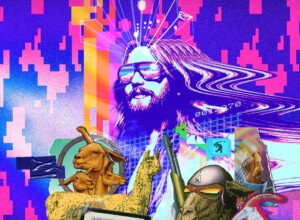Arcade is dead. Such was the title of an open letter, published by Ilari Kuittinen, the head of developer Housemarque, in 2017.
The studio had just released Nex Machina, a shoot ’em up, a collaboration with storied game designer Eugene Jarvis, and a masterwork. “It is time to bring our long-standing commitment to the arcade genre to an end,” he writes. “While this genre will always hold a special place in our hearts, the industry is moving more toward multiplayer experiences with strong, robust communities.” Four years later, Housemarque would give us Returnal, one of the best and most forlorn games of this generation, in which an astronaut crashes on an alien world, battles a baying horde, dies, and reboots, like an ailing cabinet.
Arcade is dead. I considered the truth of this sad thought as I visited NQ64, in Soho, a bar that serves cocktails with names such as “Dr. Ro Bev Nik” and “Kong Island Iced Tea.” The former packs a blend of Jack Daniels and cherry bourbon, with a sticky glug of Dr Pepper syrup. It is vile. The latter is a foam-topped slurry of rum, gin, vodka, tequila, fruit juices, and tea. This makes sense. Of all Nintendo’s characters, Donkey Kong is surely the booziest. The subtitles of many of his games sound like drinks already – “Barrel Blast,” “Tropical Freeze,” “Dixie Kong’s Double Trouble!” Though, in the name of research, it may be worth sucking down a Kirby: Beefeater pink gin, poppy liqueur, grapefruit, lime, and vanilla. Guaranteed to add a tilt and tumble to your evening.
“We’re all playing together, sharing a knowing dedication to something lost. NQ64 is a multiplayer experience with a strong, robust community.”
Along with these suppable riches, there are, of course, video games. Lots of them – tucked into corners, splayed on tables, smothered in sound-proof booths, and lined against the walls in glowing banks. The walls also glow, by the way, daubed in iridescent paint. So do many of the people, their faces lapped in the glare of screens. This shimmery effect increases, as the night wears on and the halls fill up, and the air conditioning has to battle against the bodies that keep trickling in. At one point, after huddling in an insulated wardrobe and watching some friends duke it out on Guitar Hero, I stood directly under the white grate and basked in the polar downdraught. A weird sensation, muggy heat mingling with crisp cold. Call it a tropical freeze.
NQ64 is open until three in the morning on Saturdays, the idea being to ape the atmosphere of places long gone. Places like the Trocadero Centre, which, in the 1990s, boasted six floors of amusements and cinemas, offering eager Londoners a long play’s journey into night. To be sure, there are times, in the alcoholic heat of NQ64, when you feel a trace of the old thrills. The arcade is the closest that games have come to cinema: a spot where you gather with strangers in an intimate gloom, pay to see wild things that can’t yet be bought at home, and shuffle out, once the spell is snapped, into the blinding day or the consoling dark. Like movies, games are largely solitary pursuits, hence the delicious irony of the cinema and the arcade: a pact of communal loneliness, as reality is locked out for a time.

But that isn’t quite what NQ64 is about. For one thing, the games on display are no longer new; their wildness lies in a double-glazing of irony and antiquity. Watching people flood in and light up at the novelty, you can feel the whole thing being held in quote marks. Check out the coins that you buy to feed the machines: cheap-feeling and light, with “NO CASH VALUE” stamped around the edge, and a hollow clink as they drop into the slot. (It’s the little things that stay with you, the slushy rattle of real silver.) The people in here are having fun, but reality, far from being shooed away at the door, is palpable. We’re all playing together, sharing a knowing dedication to something lost. NQ64 – which began in Manchester’s Northern Quarter and has branches in London, Liverpool, Birmingham, Edinburgh, Cardiff, and Glasgow, with more opening soon – is a multiplayer experience with a strong, robust community. If arcade is dead, is this death warmed up?
Whatever your personal feeling, I would urge you to make the trip. The reason being that, as is the case with game preservation, emulation is a worthy (some might say necessary) substitute for the genuine article. Doubly so when you have the proper hardware, as does NQ64. Me and a friend played Gunblade NY, a 1995 wonder from Sega AM3 studio, which puts your character in the belly of a chopper and has you gripping a long chunk of juddering plastic, as you fire at ground-level foes. Two things are worthy of note here. The first was that we were having something called fun, and we were having it at sixty frames per second, our shoulders pistoned into jelly with the aftershock. The second was the city of New York, its cement pouring cleanly through a Sega Model 2B CRX arcade system board – the first to incorporate graphical firepower from Lockheed Martin, no less.
It could well have been the mood, the company, or the Kong Island Iced Tea, but I swear I haven’t seen anything as beautiful in games this year. To watch that metropolis loom toward you – a blue-margined curve of grey blocks, as the helicopter knifes across sea and sky – is to get blown back to another time. To the 1990s, when Gunblade NY, the plot of which is set in 2005, would have heralded a bright future; to the early 2000s, when the sight of aircraft and blooming fireballs in Lower Manhattan would cool the pit of your stomach; and to another point, different for every one of us, when games offered a flickering on-ramp to urgent life. You don’t get that every night of the week.
And it was enough. It was a reminder, echoed by Ilari Kuittinen, that arcade is a genre as well as a space. NQ64 has supplied a space. It isn’t the same, but there are moments when it gets close, and nights when that is enough. Arcade may be dead, but good games just won’t go away.
Images: NQ64






